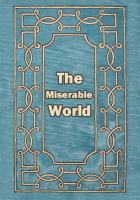I find in William James' "Varieties of Religious Experience", the following definition of religion: "Religion, therefore, as I shall ask you arbitrarily to take it, shall mean for us the feelings, acts and experiences of individuals in their solitude so far as they comprehend themselves to stand in relation to whatever they may consider the divine."
It seems to me the common man would as soon understand Einstein as this definition. In fact, the religious trends of the men and women in this world have many sources and are no more unified than their humor is. Whether all peoples, no matter how low in culture, have had religion cannot be settled by a study of the present inhabitants of the world, for every one of these, though savage, has tradition and some culture. Theoretically, for the one who accepts some form of evolution as true, at some time in man's history he has first asked himself some of the questions answered by religion.
For my part, as I read the anthropologists (whose answers to the question of the origin of religion I regard as the only valid ones, since they are the only ones without prejudice and with some regard for scientific method), it is the practical needs of man, his curiosity and his tendency to explain by human force, which are the first sources of the religions. How to get good crops, how to catch fish and game, how to win over enemies, how and whom to marry, what to do to be strong and successful as individual and group, found various answers in the taboo, the prayer, the ceremony and the priest, magician and scientist.
Curiosity as to what was behind each phenomenon of nature and the tendency of man to personalize all force, as well as the awe and admiration aroused by the strong, wise and crafty contemporary and ancestor brought into the world the "old man-cult," ancestor-worship, gods and goddesses of ranging degrees and power, but very much like men and women except for power and longevity.
Certain natural phenomena--death, sleep, trance, epileptic attack--all played their part, bringing about ideas of the soul, immortality, possession, etc. With culture and the growth of inhibition and knowledge and the use of art and symbols, the primitive beliefs modified their nature; the gods became one God, who was gradually stripped of his human desires, wishes, partialities and attributes until for the majority of the cultivated he becomes Nature, which in the end is a collection of laws in which one HOPES there is a unifying purpose. But the vast majority of the world, even in the so-called civilized countries, worship taboos, symbols, have a modified polytheistic belief or a personalized God, still attempt to persuade the Power in their own behalf, to act favorably to their own purposes and follow those who claim knowledge of the divine and inscrutable,--the priest, minister, rabbi, the man of God, in a phrase.
A part of religious feeling arises in civilized man, at least, from the feeling of awe in the presence of the vast forces of nature. Here science has contributed to religious feeling, for as one looks at the stars, his soul bows in worship mainly because the astronomer, the scientist, has told him that every twinkling point is a great sun surrounded by planets, and that the light from them must travel unimaginable millions of miles to reach him. As the world forces become impersonal they become more majestic, and a deeper feeling is evoked in their presence.
Science aids true religion by increasing awe, by increasing knowledge.
A great factor in religion is the longing to compensate for death and suffering. Religion represents a reaction against fear, horror and humiliation. It is a cry of triumph in the face of what otherwise is disaster "I am not man, the worm, sick, old, doomed to die; I am the heir of the divine and will live forever, happy and blessed." Whether religious teaching is true or not, its great value lies in the happiness and surety of those who believe.
In its very highest sense the religious life is an effort to identify oneself with the largest purpose in the world. All cooperative purposes are thus religious, all competitive nonreligious. The selfish is therefore opposed to the altruistic purpose, the narrow to the broad. Good is the symbol for the purposes that seek the welfare of all: evil is the symbol of those who seek the welfare of a person or a group, regardless of the rest.
If this definition is correct, then every reformer is religious and every self-seeker, though he wear all the symbols of a religion and pray three times a day, is irreligious. I admit no man or woman to the fellowship of the religious unless in his heart he seeks some purpose that will lift the world out of discord and into harmony.
The power of the human being to believe in the face of opposed fact, inconsistency and unfavorable result is nowhere so well exemplified as in religion. I do not speak of the untold crimes and inhumanities done in the name of religion, of human sacrifice, persecution, religious war,--these are parts of a chapter in human history outside of the province of this book and almost too horrible to be contemplated. But men have believed (and do believe) that some among them knew what God wanted, that certain procedures, tricks and ceremonies conveyed sanctity and surety; that cosmic events like storms, droughts, eclipses and epidemics had personal human meanings, that Infinite Wisdom would be guided in action by the prayers of ignorance, self-seeking and hatred, etc., etc. The savage who believes that his medicine man's antics, paint and feathers will bring rain and fertile soil has his counterpart in the civilized man who believes that this or that ceremonial and professed belief insures salvation. Faith is beautiful in the abstract, but in the concrete it is often the origin of superstition and amazing folly.[1] However crudely intelligence and honest scientific effort may work, they soar in a heaven far above the abyss of credulity.















